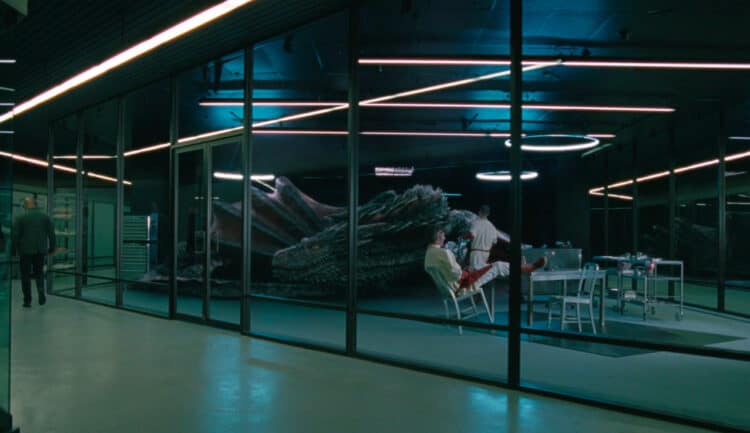
Throughout three seasons of Westworld, it’s become apparent that no one is above being mentioned or somehow used for the show in some way since the various themes that are thought to give guests a thrill are bound to be as detailed and over the top amazing as they can be to draw people in. But the appearance of a very familiar pair and a huge, scaly dragon in one episode did manage to get a lot of people thinking about the implications of seeing the creators of Game of Thrones in Westworld, along with a supposed copy of Drogon, the most powerful dragon seen in GoT. While a lot of folks likely got a kick out of this, some were bound to wonder about the theory that might crop up stating that GoT was just another simulation created by Delos, the people responsible for the overall fantasy that people paid dearly for. It would make sense in a way, wouldn’t it? And to be fair, it wouldn’t exactly be that shocking since the manner in which the hosts are treated makes it clear that guests have no regard for the worlds they’re tramping around in anyway.
But just think of it for a moment and then try to see how this would make a little bit of sense, especially with the constant criticisms and arguments that rose concerning GoT and the many issues that people found with the live-action series. Delving into the idea that GoT was all a giant simulation might open an entirely new can of worms, but it does feel as though it would cause a lot of people to be much more forgiving for the simple reason that anything they didn’t like in the show could have been attributed to one glitch or another. It’s kind of amusing to think of how easy it would be to sway people to this line of thinking since, during the course of GoT, the general feeling was that with each episode, people were bound to say they loved the direction or hate it based on their perception of how things were shaping up.
The idea of everything we know, or think we know, being a simulation is kind of terrifying, but at the same time it’s exhilarating at the same time since falling into the fantasy is exciting, but falling too deeply feels like it would force a person to lose themselves a little, and then a little more. Trying to divine the dividing line between what’s real and what’s fantasy can sometimes be a tough thing to do, especially when it comes to Westworld, but a great deal could be explained as well since the issues with GoT could be easily sorted out by stating that it’s all a simulation and that things tend to happen when the code started to break down. Maybe Jon Snow’s death wasn’t meant to happen, or maybe it happened just as it should have. Maybe some of the battles were a result of rogue elements within the system warring with each other, seeking to gain dominance in a system they can just barely feel but don’t understand. The fact that all it takes is a switch to upset the whole thing is kind of unnerving, but it would make a lot of sense given how the show went at times.
It’s a crazy thing to say, but imagining that the Night King was one of those switches for a big part of the system and that Arya’s unexpected triggering of the switch would be claimed as a valid storyline might appease some folks. Explaining parts of GoT as a glitch in another system would likely get people thinking and perhaps even allow them to forgive the multiple ‘mistakes’ that were made throughout the series. The layers upon layers of stories that got into GoT and those that go into Westworld would make for a tale that would no doubt wind around itself in a manner that would confuse the hell out of a lot of people, possibly even those that worked at Delos, but it feels as though it would be interesting, to say the least. To think that the entire fantasy world of Westeros is just a simulation would be impressive since much like Westworld, Westeros would be prone to being reset, being given new ideas to work with, and new scenarios to employ to keep people happy.
But, like always, people would be dissatisfied the moment they had seen it, done it, and found that they wanted more. Thinking that the simulation would make sense is intriguing since it would justify a lot of the decisions that were made by stating that they were either mistakes to be regretted, glitches in the system, or purposeful decisions that didn’t pan out. And the rest would be a happy accident that went right. It’s an interesting thought at least.
Drogon
 Follow Us
Follow Us





